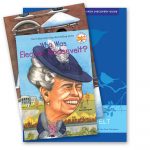Week 1: Early Life
Character Lexicon
- curious: eager to know or learn something
- awkward: not smooth or graceful; ungainly
- serious: acting or speaking sincerely and in earnest
- generous: showing a readiness to give more of something, as money or time, than is strictly necessary or expected
- shy: being reserved or having or showing nervousness or timidity in the company of other people
Comprehension Questions
- Eleanor Roosevelt was different from other first ladies in that she gave her opinions on important issues of the time, she wrote newspaper columns, taught classes, and gave radio interviews. (Pg 2)
- Eleanor Roosevelt’s nickname was Little Nell. (Pg 8)
- For many years Eleanor was frightened of boats and water because of the terrible experience she had aboard the Britannica, when it was rammed and she had to jump of the boat into the arms of her father in the lifeboat. (Pg 9/10)
- Eleanor believed her mother was disappointed in her because she did not have her mother’s beauty and was awkward and ugly. (Pg 12)
- The poor boys who lived in the home were called “newsies.” (Pg 25)
- When Eleanor was sad her favorite thing to do was read high up in a tree. (Pg 32)
- When Eleanor turned 15 her grandmother sent her school in England. (Pg 34)
Week 2: Life’s Work
Character Lexicon
- well-read: knowledgeable and informed as a result of extensive reading
- forceful: to be strong and assertive
- confident: feeling or showing certainty about something
- witty: showing or characterized by quick and inventive verbal humor
- eager: wanting to do or have something very much
Comprehension Questions
- Eleanor made herself known in her new school by speaking out and holding strong opinions. (Pg 37)
- Once attending Allenswood, Eleanor began to change from a caterpillar into a butterfly. She became confident, stood tall and wanted to be noticed. (Pg 39)
- Eleanor had to leave her school in England and return home because friends of her grandmother had seen her alone and unattended in Florence and reported it back to her grandmother. (Pg 41/42)
- Before she turned eighteen, Eleanor hoped to teach at Allenswood. (Pg 43)
- The purpose of the elegant balls that Eleanor attended when she was young was to meet a future husband. (Pg 46)
- When Eleanor heard of the poor conditions in the factories she tried to make change by writing to politicians urging them to change the working laws and make factories a safer place to work. (Pg 50)
- Eleanor chose to have her wedding day on St. Patrick’s day in 1905 because her Uncle Teddy, President Theodore Roosevelt was in New York on that day for a big parade and would be able to attend the wedding. (Pg 54)
Week 3: Later Life and Legacy
Character Lexicon
- elegant: pleasingly graceful and stylish in appearance or manner
- opinionated: conceitedly assertive and dogmatic in one’s opinions
- free-spirited: independent and not constrained by convention
- comforting: serving to alleviate a person’s feelings of grief or distress
- motherly: resembling, or characteristic of a mother, especially in being caring, protective, and kind
Comprehension Questions
- When Eleanor moved to Washington D.C. people compared her to the perfect “Gibson Girl.” (Pg 67)
- When the US entered WWI, Eleanor worked for the Red Cross serving coffee and food. (Pg 68)
- Political members of the Democratic Party remembered Franklin Roosevelt because of Eleanor and the work and speeches she gave within the party. (Pg 72)
- Eleanor helped Franklin get elected as Governor of New York by convincing the women of the city to vote for him. (Pg 73)
- Eleanor donated any money she made from lectures to her favorite causes. (Pg 82)
- During her time at the United Nations, Eleanor worked on human rights and education for women and children. (Pg 97)
- The president that Eleanor helped to elect in 1960 was John F. Kennedy. (Pg 101)

